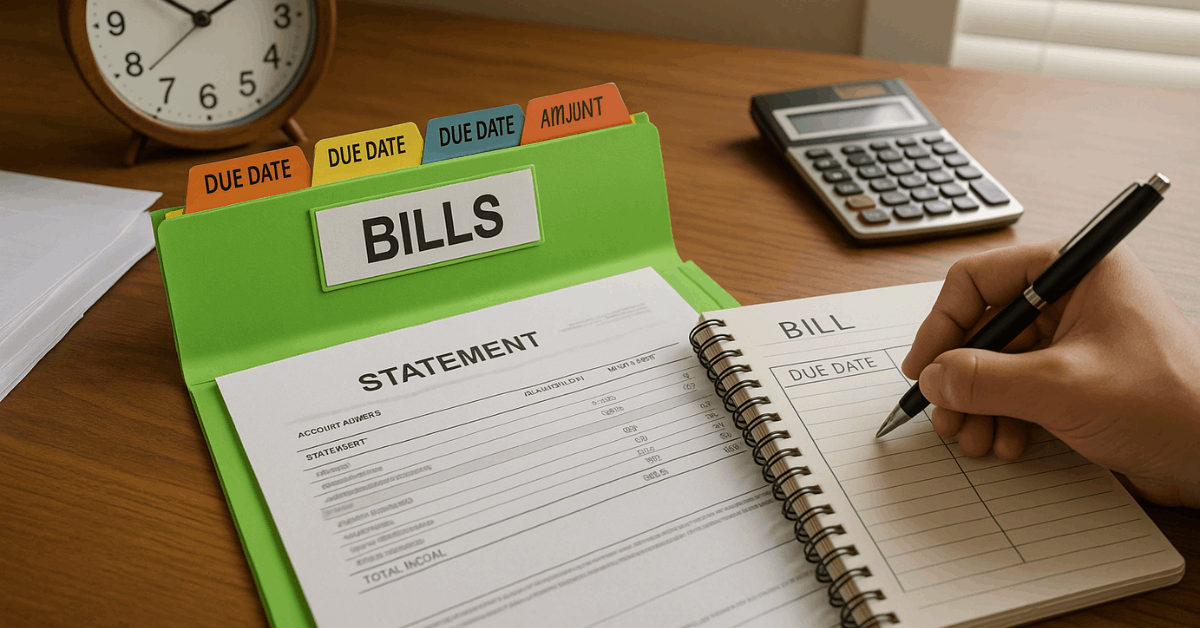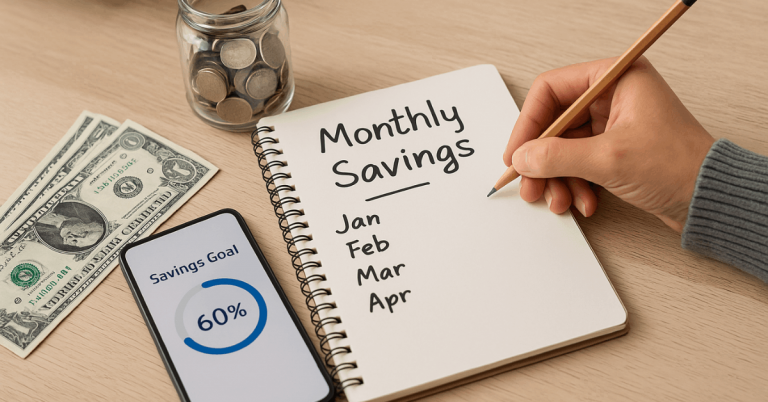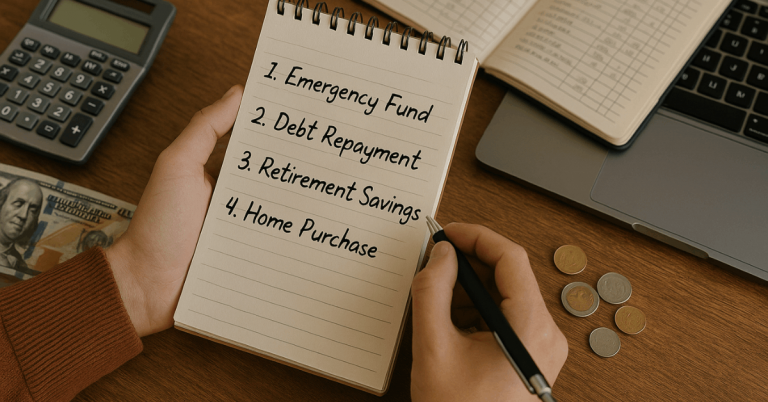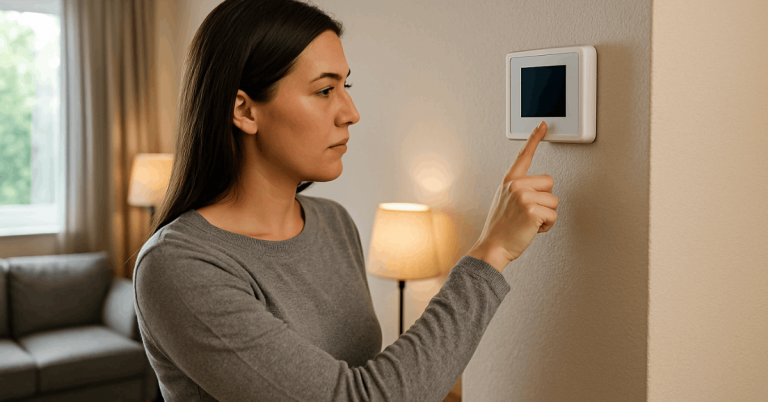Paying your bills on time helps you avoid penalties and maintain a healthy financial reputation. Many people miss due dates simply because they lack an organized system.
When your bills are correctly tracked, you gain better control over your budget and peace of mind.
This guide explains clear, practical ways to organize your bills so you never miss another payment.

1. Understand the Importance of Bill Organization
Before you start planning, it’s important to know why keeping bills organized matters. Organized payments ensure financial stability and protect your credit rating.
When bills pile up or are forgotten, it can lead to late fees and damaged credit scores. A consistent payment routine helps build trust with service providers and lenders.
Staying organized also minimizes financial stress and allows you to plan future expenses confidently. You save time and money when you manage your finances efficiently.
2. Identify and List All Your Bills
Knowing what you owe and when is the first step to better financial organization. Listing every recurring expense gives you a full picture of your obligations.
Write down all your monthly bills—including rent, utilities, phone plans, internet, insurance, and credit cards. Don’t forget irregular ones like annual memberships or taxes.
Include due dates and the average amount for each. A complete list ensures nothing is missed during your payment planning.
Use a Master List or Spreadsheet
Creating a centralized list helps track all payments easily. You can use paper, spreadsheets, or digital tools.
- Include payment details such as due dates, amounts, and payment methods.
- Color-code bills based on urgency or category for easier tracking.
- Update regularly when new bills appear or amounts change.
This simple method prevents confusion and keeps your financial overview clear.
3. Create a Monthly Payment Calendar
A payment calendar visually reminds you of due dates. It helps you plan when to pay bills according to your income schedule.
Use a digital calendar or physical planner to mark payment days. Aligning bills with your salary schedule ensures enough funds are available.
Add a few days as a safety buffer before each due date. This system prevents late fees and builds a consistent payment habit.
Sync with Your Pay Schedule
If you get paid biweekly or monthly, match your bill payments accordingly. Scheduling bills around paydays guarantees your account balance covers expenses.
Adjust your payment dates with service providers if necessary. This helps you manage cash flow effectively and reduces the risk of overdraft charges.
4. Set Up Automatic Payments When Possible
Automation ensures payments are never forgotten. It also saves you time and effort every billing cycle.
Many banks and companies offer auto-pay options for recurring bills like loans, credit cards, or utilities.
Automatic deductions eliminate the need to remember every deadline. However, always monitor your account balance to prevent overdrafts. Consistent automation promotes reliability and keeps your records clean.
Keep a Separate Account for Bills
Managing bills from a dedicated bank account keeps things organized. It separates essential payments from daily spending.
- Deposit funds into this account every payday.
- Automate payments only from this account.
- Track remaining balance to ensure all bills are covered.
This method simplifies budgeting and reduces errors in tracking expenses.
5. Use Budgeting Apps to Stay Organized
Modern budgeting tools simplify financial management and reminders. They make it easier to keep up with multiple payments.
Apps like Mint, YNAB, or PocketGuard automatically categorize your spending. They provide visual charts that show how your money is used.
Many also send alerts before bills are due. These digital tools help you stay in control and make adjustments anytime.
Compare App Features Before Choosing
Not all budgeting apps function the same way.
- Check if the app supports automatic bill tracking and notifications.
- Look for bank account syncing for real-time updates.
- Choose one with a user-friendly interface to make monitoring easy.
Using the right app can make your entire financial system more efficient.
6. Review and Adjust Your Bills Regularly
Bills can change over time, so regular reviews are necessary. Monitoring them helps you spot errors and unnecessary charges.
Set a monthly or quarterly reminder to review all your recurring payments. Cancel services you no longer use, such as streaming subscriptions or memberships.
Reviewing bills also helps identify rate changes from providers. Staying proactive ensures you’re not paying for outdated services.
Negotiate or Cancel Unnecessary Services
If your bills are too high, talk to your providers. Many companies offer promotions or lower plans if you ask.
- Compare alternatives for better rates.
- Cancel duplicates like multiple streaming platforms.
- Bundle services where possible to save money.
Negotiating bills is an easy way to lower your overall monthly spending.
7. Use Payment Reminders Effectively
Reminders are essential for people managing multiple due dates. They reinforce good payment habits.
Set up mobile notifications, text alerts, or email reminders. Most banks and apps allow automatic scheduling for these alerts.
Combine digital and manual reminders if needed. The key is consistency—getting notified ahead of time helps prevent missed payments.
Combine Digital and Physical Reminders
Some people remember better with visual cues.
- Post sticky notes near your work desk or fridge.
- Use color markers to highlight urgent dates on a wall calendar.
- Keep a small notebook of upcoming bills.
This combination strengthens memory and improves accountability.
8. Keep Track of Receipts and Payment Confirmations
Keeping proof of payment prevents confusion later. It also helps in resolving billing disputes.
Organize receipts and statements either physically or digitally. Store them in folders labeled by month or bill type.
You can use cloud storage like Google Drive for easy access. A good filing system saves time if you ever need to confirm payments.
Organize by Month or Bill Type
A well-labeled filing system avoids mix-ups.
- Create separate folders for rent, utilities, and credit cards.
- Scan paper receipts and upload them for safekeeping.
- Delete outdated files after a year to keep things tidy.
Maintaining an archive ensures transparency in your financial records.
9. Prioritize High-Impact Payments
Some bills require immediate attention because of their consequences. Knowing which ones matter most keeps you financially stable.
Essential bills include rent or mortgage, electricity, and credit card payments. Always pay these before optional expenses.
Falling behind on these can hurt your credit history or living situation. Once essentials are covered, handle secondary payments next.
Create a Payment Hierarchy
Prioritize bills in three categories:
- Essential: Rent, mortgage, and utilities.
- Flexible: Insurance, loans, or internet.
- Optional: Entertainment, gym, or subscriptions.
This structure helps manage limited income efficiently.
10. Review Your Financial Habits
Your bill management system only works if your habits support it. Self-assessment ensures consistent success.

Look back at how often you’ve paid late or overspent. Identify what caused those issues—lack of reminders or poor planning.
Replace old habits with better ones, like weekly bill checks. Over time, this builds stronger financial discipline.
Adjust Based on Past Mistakes
Improvement happens when you learn from experience.
- Track missed payments and note the reasons.
- Add stronger alerts for weak areas.
- Reward yourself after several months of on-time payments.
This motivates you to maintain consistency in your financial routine.
11. Use Paperless Billing for Efficiency
Digital billing saves space and keeps everything accessible. It’s also more environmentally friendly.
Most companies now offer electronic statements through email or apps. Paperless billing centralizes all your bills in one place.
You can easily search for old invoices and track history. This reduces clutter and makes documentation simpler.
Create a Dedicated Billing Email
Managing emails from different accounts can be messy.
- Use a separate inbox for all billing messages.
- Create folders for each provider.
- Archive old receipts after confirming successful payments.
This keeps your primary email clean and improves organization.
12. Plan Ahead for Unexpected Expenses
Emergencies can disrupt your payment schedule if you’re unprepared. Building a small safety net helps prevent financial stress.
Set aside a buffer fund dedicated to bills. Even one month’s worth can make a difference.
This reserve ensures payments continue even during income interruptions. Regular contributions to your emergency fund maintain your stability.
Set Aside Buffer Savings
Consistency matters when saving for emergencies.
- Transfer a fixed amount every payday.
- Keep it in a separate account from your main savings.
- Avoid spending it except for genuine emergencies.
This habit guarantees you always have funds for upcoming bills.
Conclusion – Take Control of Your Finances Today
Organizing your bills for on-time payments is the foundation of good financial health.
By setting reminders, using automation, and reviewing habits regularly, you’ll gain lasting stability.
Every organized payment reduces stress and improves your credit reputation. Start applying these methods today and enjoy the confidence that comes with full financial control.











